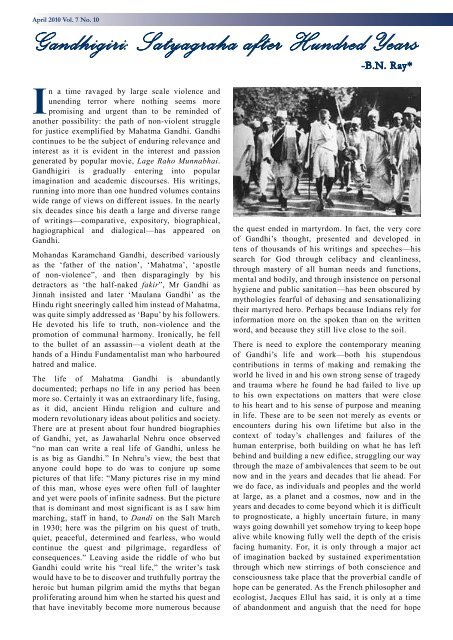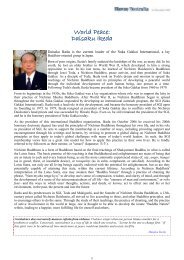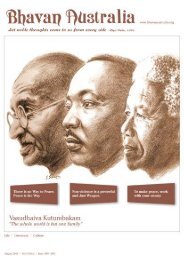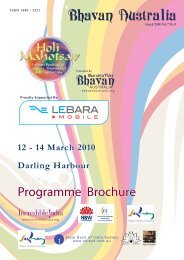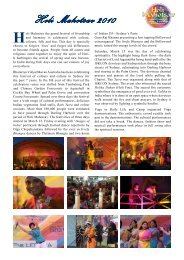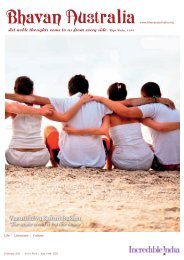'The whole world is but one family' - Bharatiya Vidya Bhavan Australia
'The whole world is but one family' - Bharatiya Vidya Bhavan Australia
'The whole world is but one family' - Bharatiya Vidya Bhavan Australia
You also want an ePaper? Increase the reach of your titles
YUMPU automatically turns print PDFs into web optimized ePapers that Google loves.
April 2010 Vol. 7 No. 10<br />
Gandhigiri: Satyagraha after Hundred Years<br />
In a time ravaged by large scale violence and<br />
unending terror where nothing seems more<br />
prom<strong>is</strong>ing and urgent than to be reminded of<br />
another possibility: the path of non-violent struggle<br />
for justice exemplified by Mahatma Gandhi. Gandhi<br />
continues to be the subject of enduring relevance and<br />
interest as it <strong>is</strong> evident in the interest and passion<br />
generated by popular movie, Lage Raho Munnabhai.<br />
Gandhigiri <strong>is</strong> gradually entering into popular<br />
imagination and academic d<strong>is</strong>courses. H<strong>is</strong> writings,<br />
running into more than <strong>one</strong> hundred volumes contains<br />
wide range of views on different <strong>is</strong>sues. In the nearly<br />
six decades since h<strong>is</strong> death a large and diverse range<br />
of writings—comparative, expository, biographical,<br />
hagiographical and dialogical—has appeared on<br />
Gandhi.<br />
Mohandas Karamchand Gandhi, described variously<br />
as the ‘father of the nation’, ‘Mahatma’, ‘apostle<br />
of non-violence”, and then d<strong>is</strong>paragingly by h<strong>is</strong><br />
detractors as ‘the half-naked fakir”, Mr Gandhi as<br />
Jinnah ins<strong>is</strong>ted and later ‘Maulana Gandhi’ as the<br />
Hindu right sneeringly called him instead of Mahatma,<br />
was quite simply addressed as ‘Bapu’ by h<strong>is</strong> followers.<br />
He devoted h<strong>is</strong> life to truth, non-violence and the<br />
promotion of communal harmony. Ironically, he fell<br />
to the bullet of an assassin—a violent death at the<br />
hands of a Hindu Fundamental<strong>is</strong>t man who harboured<br />
hatred and malice.<br />
The life of Mahatma Gandhi <strong>is</strong> abundantly<br />
documented; perhaps no life in any period has been<br />
more so. Certainly it was an extraordinary life, fusing,<br />
as it did, ancient Hindu religion and culture and<br />
modern revolutionary ideas about politics and society.<br />
There are at present about four hundred biographies<br />
of Gandhi, yet, as Jawaharlal Nehru once observed<br />
“no man can write a real life of Gandhi, unless he<br />
<strong>is</strong> as big as Gandhi.” In Nehru’s view, the best that<br />
any<strong>one</strong> could hope to do was to conjure up some<br />
pictures of that life: “Many pictures r<strong>is</strong>e in my mind<br />
of th<strong>is</strong> man, whose eyes were often full of laughter<br />
and yet were pools of infinite sadness. But the picture<br />
that <strong>is</strong> dominant and most significant <strong>is</strong> as I saw him<br />
marching, staff in hand, to Dandi on the Salt March<br />
in 1930; here was the pilgrim on h<strong>is</strong> quest of truth,<br />
quiet, peaceful, determined and fearless, who would<br />
continue the quest and pilgrimage, regardless of<br />
consequences.” Leaving aside the riddle of who <strong>but</strong><br />
Gandhi could write h<strong>is</strong> “real life,” the writer’s task<br />
would have to be to d<strong>is</strong>cover and truthfully portray the<br />
heroic <strong>but</strong> human pilgrim amid the myths that began<br />
proliferating around him when he started h<strong>is</strong> quest and<br />
that have inevitably become more numerous because<br />
-B.N. Ray*<br />
the quest ended in martyrdom. In fact, the very core<br />
of Gandhi’s thought, presented and developed in<br />
tens of thousands of h<strong>is</strong> writings and speeches—h<strong>is</strong><br />
search for God through celibacy and cleanliness,<br />
through mastery of all human needs and functions,<br />
mental and bodily, and through ins<strong>is</strong>tence on personal<br />
hygiene and public sanitation—has been obscured by<br />
mythologies fearful of debasing and sensationalizing<br />
their martyred hero. Perhaps because Indians rely for<br />
information more on the spoken than on the written<br />
word, and because they still live close to the soil.<br />
There <strong>is</strong> need to explore the contemporary meaning<br />
of Gandhi’s life and work—both h<strong>is</strong> stupendous<br />
contri<strong>but</strong>ions in terms of making and remaking the<br />
<strong>world</strong> he lived in and h<strong>is</strong> own strong sense of tragedy<br />
and trauma where he found he had failed to live up<br />
to h<strong>is</strong> own expectations on matters that were close<br />
to h<strong>is</strong> heart and to h<strong>is</strong> sense of purpose and meaning<br />
in life. These are to be seen not merely as events or<br />
encounters during h<strong>is</strong> own lifetime <strong>but</strong> also in the<br />
context of today’s challenges and failures of the<br />
human enterpr<strong>is</strong>e, both building on what he has left<br />
behind and building a new edifice, struggling our way<br />
through the maze of ambivalences that seem to be out<br />
now and in the years and decades that lie ahead. For<br />
we do face, as individuals and peoples and the <strong>world</strong><br />
at large, as a planet and a cosmos, now and in the<br />
years and decades to come beyond which it <strong>is</strong> difficult<br />
to prognosticate, a highly uncertain future, in many<br />
ways going downhill yet somehow trying to keep hope<br />
alive while knowing fully well the depth of the cr<strong>is</strong><strong>is</strong><br />
facing humanity. For, it <strong>is</strong> only through a major act<br />
of imagination backed by sustained experimentation<br />
through which new stirrings of both conscience and<br />
consciousness take place that the proverbial candle of<br />
hope can be generated. As the French philosopher and<br />
ecolog<strong>is</strong>t, Jacques Ellul has said, it <strong>is</strong> only at a time<br />
of abandonment and angu<strong>is</strong>h that the need for hope


